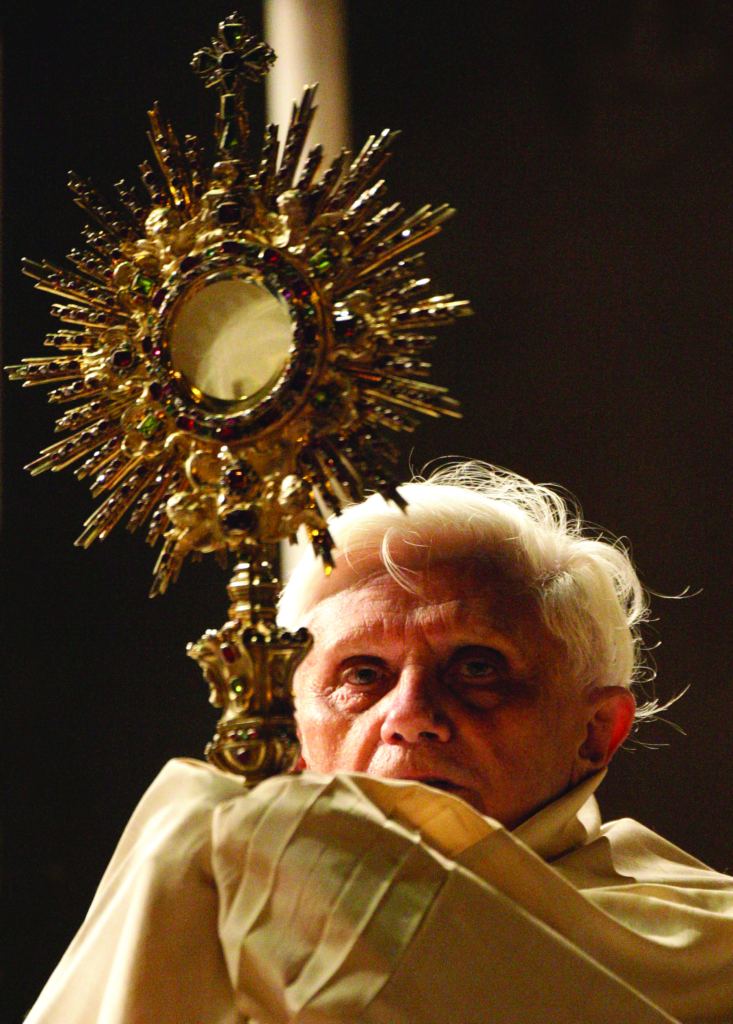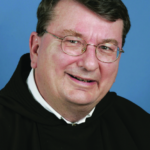Quiet and humble, yet fearless, Benedict bore with steadfast faith the slings and arrows hurled at him
By Thomas G. Weinandy, OFM, Cap.

May 25, 2005 – Rome. Holy Mass for Corpus Christi, celebrated by Pope Benedict XVI, with the beginning of the Procession in San Giovanni in Laterano and Benediction in Santa Maria Maggiore (Photo Grzegorz Galazka)
Saint Pope John Paul II was beloved by people throughout the entire world. He was outgoing. He loved the crowds. As an actor he played to his audience and won them over. He was a master at preaching the Gospel and at winning souls to Christ. He was a fighter who took on the world of disbelief.
Moreover, he was a great academic. His philosophical and theological acumen is seen in his encyclicals – his robust defense and proclamation of the Church’s moral teaching, and his astute understanding of the relationship between faith and reason. He, likewise, possessed a great love for the Church and for the Eucharist. It is hard to imagine a greater Pope.
Pope Benedict XVI was a different sort of man, yet a man who was loved by the people as well – but for different reasons. Benedict was shy and unassuming. He did not relish the excitement of huge crowds. Nonetheless, he was also an authentic and fearless proclaimer of the Gospel in the midst of a culture of relativism. He was, likewise, a great theologian, but in a manner that was singularly his own. His theology was imbued with a love for sacred tradition, particularly that of the sacred liturgy. He promoted a love for the liturgy by fostering the beauty of the liturgy. He recognized that, as the supreme pontiff, he was not to be an innovator or trendsetter, but the guardian and advocate of the ever-living and ever-life-giving apostolic tradition. And for these reasons people loved him – with a robust but quiet love. This affection was readily displayed in the one hundred and fifty thousand people who paid their respects as he lay in state in St. Peter’s Basilica, and in the thousands who participated in his funeral. He was beloved by cardinals, bishops, priests, and, above all, by the lay faithful.
Thus, what I appreciated most about Pope Benedict XVI, a virtue that he manifested throughout his life, was his quiet humility. He was never a boisterous man pushing himself into the limelight. Rather, his calm, unassuming presence brought to every situation a reassuring strength that all would be done well and in accordance with the Holy Spirit’s will. This quiet humility was founded, not upon Benedict’s intellectual acumen, but upon his firmness of faith in the Gospel, a faith that was expressed in the Church’s magisterial teaching and her ecclesial theological tradition. Even in his retirement, these virtues were silently and prayerfully manifested.
This humble love for the Gospel and the Church’s teaching is witnessed during Benedict’s time as Prefect of the Congregation for the Doctrine of the Faith. While he was often criticized for being overly zealous in his search for suspected heresy, yet that is not accurate. His approach was much more positive – engendering and encouraging the theological and academic community in their pursuit of bringing to light the fullness of truth that Jesus and the Catholic theological tradition embodied. As Pope this affirmative attitude perdured. Benedict’s talks and encyclicals consistently presented the truths of the faith in a manner that would win over the doubter and confirm the faith of the believer. Benedict was but a humble servant of Jesus Christ, his Lord and Savior.
Benedict’s quiet humility was not founded on his intellectual acumen, but on his firmness of faith in the Gospel
That being said, all would acknowledge, and most would praise, Benedict’s intellectual ability, a gift that is seen in his academic work. To this day, his Introduction to Christianity continues to be read by appreciative students and members of the theological academy alike. Likewise, his Spirit of the Liturgy is a foundational text for appreciating and understanding the Church’s liturgy that has come down to us through the ages. Benedict, in many ways, was a liturgical theologian. He loved the Mass and the sacraments, for he was convinced that they enacted, made present, all the mysteries of the faith, such that those who participated in them reaped their saving benefits. I am also convinced that every priest and seminarian should be required to read and study his Spirit of the Liturgy. Not only do I think that they would come to love the liturgy as Benedict loved it, but such study would also help alleviate much of the rancor that exists in our present “liturgical wars.” Much of his sound learning and wise counsel would calmly prevail.
Both before and after his election as Pope, Joseph Ratzinger bore the slings and arrows that were hurled at him by many within and outside the Church. Members of the secular and ecclesial liberal elite media were, and still are, relentless in their criticism and in their characterization of him as an unyielding rigid conservative. However, such rancor towards Benedict merely makes evident the lack of faith among many of his critics, as well as simultaneously highlighting his own steadfastness in the faith. Benedict, as a person, as an academic, as an archbishop, and as Pope was and remains a light in the darkness of our present world. His light will continue to shine even now when he has passed from this world into his heavenly reward. There, with all of the saints, he will give glory to God the Father, in union with Jesus, the risen incarnate Son, in communion with the love of the Holy Spirit. He will forever rejoice in celebrating the heavenly liturgy – the heavenly Eucharistic banquet of the Lamb.
 Thomas G. Weinandy, OFM, Capuchin, is a former member of the Vatican’s International Theological Commission.
Thomas G. Weinandy, OFM, Capuchin, is a former member of the Vatican’s International Theological Commission.






Facebook Comments